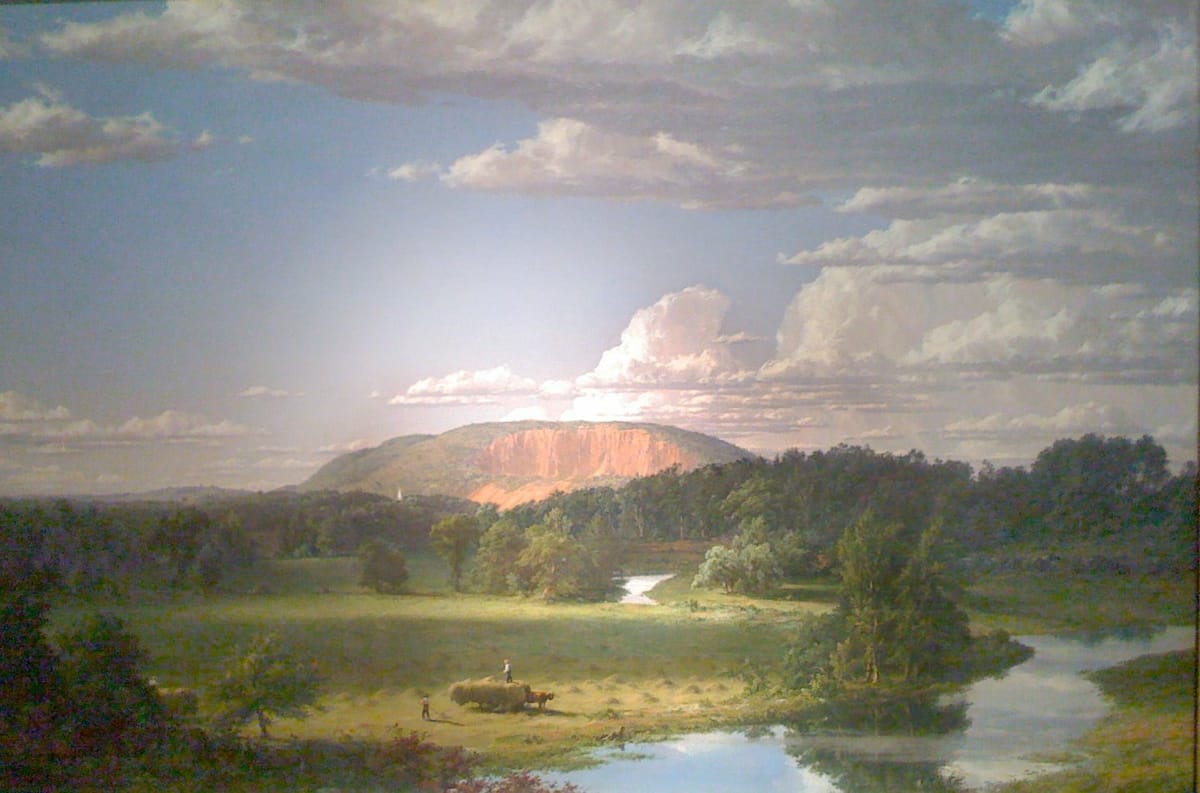Sperry family in Woodbridge

Richard Sperry is said to have been the first European settler to live in what is now Woodbridge, arriving in New Haven in 1643 and farming the land here in the vicinity of West Rock possibly as early as 1648.
According to page 181 of The Descendants of Thomas Dickerman:
Richard Sperry was among the early settlers of New Haven, though not one of the original planters. His name occurs Jan. 4, 1643, and again in the Court records May 2, 1648, where the entry is "Richard Sperry was complained of for not coming to watch, but Mr. Goodier answered for him that when he was neare comeing from the farme they wanted an oxe; the neager said he was sicke and left in the woods; so he was faine to goe forth to seeke hime least he should be lost."
[Yale] President Stiles says that Stephen Goodyear, “a rich settler bought of the town [of New Haven] a tract of a thousand or twelve hundred acres of land in the fertile valley to the westward of West Rock and planted on it his farmer Richard Sperry, which farm Richard Sperry afterwards became possessed of, and it was known as Sperry's Farm. On this tract Mr. Goodyear built Sperry a house; and in the woods about a mile south-west stood the house of Ralph Lines. These were the only two houses in 1661 between West Rock and Hudson River, except a few at Derby. All was an immense wilderness.”
This allusion is made in describing the part which Richard Sperry played in protecting the regicides, Goffe and Whalley. At the time when pursuers from England were trying to ferret out their hiding place, three friends, William Jones, Richard Sperry and another by the name of Burril, led them out of town into this wilderness, and here they were kept safely concealed. The first retreat was at a place three or four miles from town to which the fugitives gave the name of "Hatchet Harbor," from a hatchet they found with which to build a shelter. Then after two nights they were taken up the cliff, which they named "Providence Hill," and here a pile of huge rocks was shown them under whose arching sides a better lodging could be made, while the elevation gave a commanding view of the town and the bay. This group of rocks is still known as "The Judges' Cave."
Here they continued from the 15th of May to the 11th of June 1661: usually spending their nights at the cave, as well as days, but sometimes in stormy weather going down to the house of their guardian. " Richard Sperry daily supplied them with food; sometimes carrying it himself, at other times sending it by one of his boys, tied up in a cloth, ordering them to lay it on a certain stump and leave it: and when the boy went there at night he always found the basons emptied of the provisions, and brought them home. Upon the boy's wondering and asking what it meant he was told that there was somebody at work in the woods that wanted it."
One night a panther, or some other wild animal, visited them at this spot and frightened them so that they dared not sleep there again and had to find another place to hide. Probably Richard Sperry was the only person who knew their exact whereabouts, and he kept the secret so well that the king's officers pursued a vain search." Richard Sperry and his wife Denis had ten children and over sixty grandchildren. It is said that everyone in North America with the surname Sperry descend from Richard and Denis. According to page 684 of The Tuttle Family the couple's ten children were:
- John, born Jan. 9, 1649, married Sep. 1, 1676, Elizabeth Post
- Mary, born March 14, 1650, married March 29, 1670, Benjamin Peck
- Richard, Jr. born Jan. 20, 1652, married Dec. 16, 1680, Martha Mansfield
- Hester, born Sep. 1654, married June 21,1683, Daniel Hotchkiss
- Nathaniel, born Aug. 13, 1656, married Oct. 2, 1683, Sarah Dickerman
- Thomas, born July 13, 1658, married Nov. 18, 1684, Elizabeth Fearne
- a child, born 1661, died young
- Ebenezer, born July 1663, married Jan. 21, 1689, Abigail Dickerman
- Daniel, born 1665, married April 3, 1694, Deborah Peck
- Joseph, born July 24, 1668, married and had a son Joseph